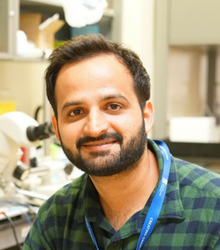Research Area
Neural circuits and Behavior
Research Interests
Animals learn from their experiences and modify their actions to survive. These experiences are encoded in brain circuits, which provide an adaptive behavioral response. Our group studies the brain circuit mechanisms that underpin adaptive behavioral phenotypes developed in response to external stimuli. Acute and chronic exposure to external stimuli might have distinct effects on brain circuits. While acute exposure may be adaptive, chronic exposure can result in brain-wide neural adaptation, which may create maladaptive behaviors. Our research will use natural rewards and drugs to study how acute and chronic exposure to both affects brain circuits. We believe there is a significant overlap and divergence between how natural rewards and drugs affect the brain. Our research intends to identify the important brain circuits that have been altered, and we intend to use advanced neuromodulation technologies in mice, such as chemo/optogenetics, to investigate the role of specific neural circuits. By comparing natural rewards and drugs, we aim to decode the brain processes that drives addictive consumption of food and drugs. To investigate these neural systems, we use viral tracing techniques, in-vivo calcium imaging, transcriptomics, and computational modeling.
Since 2023 : Assistant Professor, Department of Biological Sciences, IISER Mohali
2022 - 2023 : Junior Investigator, Inserm U1114, Center Research Biomedicine De Strasbourg (CRBS), France
2017 - 2022 : Postdoctoral Research Fellow, Institute of Molecular and Cell Biology, Agency for Science, Technology and Research(A*STAR), Singapore
2010 - 2016 : Turku Bioscience - Turku Centre for Biotechnology, Åbo Akademi University, Turku, Finland
2007 - 2009 : MSc , School of Biotechnology, Jawaharlal Nehru University (JNU), New Delhi, India
2004 - 2007 : BSc, Department of Microbiology, Panjab University, Chandigarh, India
Young Individual Research Grant (YIRG) of SGD 300,000 from National Medical Research Council of Singapore (2020)
Career Development Award (CDA) of SGD 300,000 as a co-principal investigator by Agency for Science Technology and Research (ASTAR), Singapore (2020)
Singapore Bioimaging consortium (SBIC) award grant of SGD 40000 in 2020.
INSTRUMENTARIUMIN TIEDESÄÄTIÖ SR (12000 Euros) fellowship for PhD thesis (2016).
Awarded fellowship by Doctoral Network of Molecular Biosciences, Åbo Akademi University for PhD (2014)
Esra Senol and Hasan Mohammad. Current perspectives on brain circuits involved in food addiction-like behaviors. Journal of Neural Transmission, pages 1–11, 2024.
Francesca Mandino, Ling Yun Yeow, Renzhe Bi, Lee Sejin, Han Gyu Bae, Seung Hyun Baek, Chun-Yao Lee, Hasan Mohammad, Corey Horien, Chai Lean Teoh and others. The lateral entorhinal cortex is a hub for local and global dysfunction in early Alzheimer’s disease states. Journal of Cerebral Blood Flow & Metabolism 42(9):1616–1631, 2022.
Hasan Mohammad, Esra Senol, Martin Graf, Chun-Yao Lee, Qin Li, Qing Liu, Xin Yi Yeo, Menghan Wang, Achilleas Laskaratos, Fuqiang Xu and others. A neural circuit for excessive feeding driven by environmental context in mice. Nature Neuroscience 24(8):1132–1141, 2021.
Siew Cheng Phua, Yu Lin Tan, Alison Maun Yeng Kok, Esra Senol, Christine Jin Hui Chiam, Chun-Yao Lee, Yanmin Peng, Auriel Theodora Jacobea Lim, Hasan Mohammad, Jing-Xuan Lim and others. A distinct parabrachial–to–lateral hypothalamus circuit for motivational suppression of feeding by nociception. Science Advances 7(19):eabe4323, 2021.
Emilia Komulainen, Artemis Varidaki, Natalia Kulesskaya, Hasan Mohammad, Christel Sourander, Heikki Rauvala and Eleanor T Coffey. Impact of JNK and its substrates on dendritic spine morphology. Cells 9(2):440, 2020.
Sarah Xinwei Luo, Ju Huang, Qin Li, Hasan Mohammad, Chun-Yao Lee, Kumar Krishna, Alison Maun-Yeng Kok, Yu Lin Tan, Joy Yi Lim, Hongyu Li and others. Regulation of feeding by somatostatin neurons in the tuberal nucleus. Science 361(6397):76–81, 2018.
H Mohammad, F Marchisella, S Ortega-Martinez, P Hollos, K Eerola, E Komulainen, N Kulesskaya, E Freemantle, V Fagerholm, E Savontous and others. JNK1 controls adult hippocampal neurogenesis and imposes cell-autonomous control of anxiety behaviour from the neurogenic niche. Molecular psychiatry 23(2):362–374, 2018.
Artemis Varidaki, Hasan Mohammad and Eleanor T Coffey. Molecular mechanisms of depression. In Systems Neuroscience in Depression. Elsevier, 2016, pages 143–178.
Emilia Komulainen, Justyna Zdrojewska, Erika Freemantle, Hasan Mohammad, Natalia Kulesskaya, Prasannakumar Deshpande, Francesca Marchisella, Raghavendra Mysore, Patrik Hollos, Kimmo A Michelsen and others. JNK1 controls dendritic field size in L2/3 and L5 of the motor cortex, constrains soma size, and influences fine motor coordination. Frontiers in cellular neuroscience 8:272, 2014.
Benny Björkblom, Artur Padzik, Hasan Mohammad, Nina Westerlund, Emilia Komulainen, Patrik Hollos, Lotta Parviainen, Anastassios C Papageorgiou, Kristiina Iljin, Olli Kallioniemi and others. c-Jun N-terminal kinase phosphorylation of MARCKSL1 determines actin stability and migration in neurons and in cancer cells. Molecular and cellular biology 32(17):3513–3526, 2012.
Prashant Mohanpuria, Vinay Kumar, Monika Mahajan, Hasan Mohammad and Sudesh Kumar Yadav. Gene silencing: theory, techniques and applications. International Journal of Medical and Biological Frontiers 17(4/5):427, 2011.
Jyoti Bhardwaj, Hasan Mohammad and Sudesh Kumar Yadav. Computational identification of microRNAs and their targets from the expressed sequence tags of horsegram (Macrotyloma uniflorum (Lam.) Verdc.). Journal of structural and functional genomics 11:233–240, 2010.






